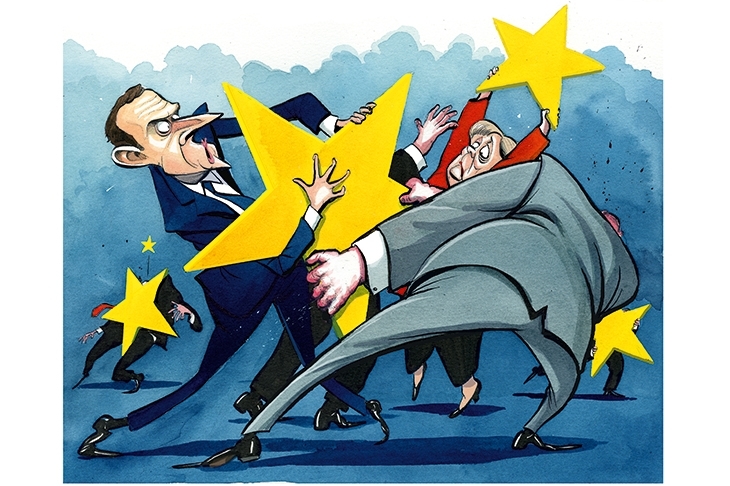Coronavirus is obscuring much about the future of the EU — and Britain’s relationship with it. Not everyone is joining the dots, but business is. And this means the decision for a no-deal Brexit is being taken outside of the official negotiations.
Nissan unveiled its global restructuring this week after making a £5 billion ($6 billion) net loss in the last financial year. It will close its Barcelona factory with a loss of 2,800 jobs while the Spanish government has said this was the end of Nissan’s manufacturing in Europe. And so it is if Europe means the EU. For Nissan also announced that the future of its UK plant in Sunderland was secure. Why is this significant? If we cast our minds back to a pre-COVID world, on February 3 the Financial Times carried a headline ‘Nissan drafts plan to double down on UK under hard Brexit’. According to the leak from two individuals involved in the discussions, in the event of a hard Brexit and UK-EU tariffs on car exports, the Japanese carmaker would concentrate on boosting its 4 percent UK market share to 20 percent.
Meanwhile, the ailing French vehicle manufacturer Renault, in which the French state has a 15 percent share-holding, has announced the closure of three plants in France and thousands of job losses. Renault, it should be remembered, is in a choppy alliance with Nissan that the Carlos Ghosn affair worsened. Given that Renault was about to receive €5 billion ($5.5 billion) of state funding as part of France’s coronavirus bailout, the French government and president Macron were up in arms. Adding insult to injury, it has been suggested that restructuring could involve shifting production of the Nissan Micra from Renault France to Nissan Sunderland. Such an eventuality would have the additional blow of demonstrating in Macron’s eyes that Brexit could be a winner. Yet it seems that in the Nissan case and doubtless many more, despite the public protestations, business was embracing a no-deal Brexit
The EU has suspended its state aid and competition rules, opening the flood-gates to member-state bail-outs of national business champions. Air France will receive €7 billion ($7.7 billion) and Lufthansa €9 billion ($10 billion). This, of course, unfairly rigs the European airline market in favor of failing airlines to the detriment of their ‘frugal’ counterparts. It also blows a hole in the EU dogma and insistence on a ‘level-playing field’ in a Brexit trade deal, as Matthew Lynn recently pointed out on this site. The EU is all too conscious of this and how it will take years to roll back state aid. The Commission is attempting to salvage some of its principles by insisting that in exchange Lufthansa must give up a few slots at some European airports, while Air France should comply with the European Green Deal by abandoning domestic routes with less than a two-and-a-half-hour journey time. This is merely the tip of the iceberg for European members state aid. Either the ‘level playing field’ mantra is dropped in what is left of the negotiations, or more likely June becomes the semi-official date for a no-deal Brexit.
***
Get three months of The Spectator for just $9.99 — plus a Spectator Parker pen
***
The EU’s recently agreed €750 billion ($833 billion) coronavirus bail-out and debt mutualization package is a further decision taken outside the official Brexit negotiations that consecrates a no-deal outcome. Even if the EU package is eventually trimmed back by the frugal northern states, the UK cannot risk acceding to an extension for fear of having to continue paying into the new and dramatically increased EU 2021-27 budget from January 1. Furthermore, the Commission — habitually more punitive of the UK than the Council — will have its powers dramatically increased to cover tax-raising and oversight of national expenditure. So not only would the UK be liable for some eye-watering budgetary contributions but it would also be caught by new taxes that could inter alia hit the City of London, such as the long-mooted tax on European financial transactions. This makes Michel Barnier’s statement this week that the EU is open to a two-year extension risible.
Finally, back to the side-show of the official Brexit negotiations. After Britain’s chief negotiator’s broadside of a letter a few weeks ago on the need for the EU negotiators to get real, David Frost added a further nail to the negotiation’s coffin. On May 27, he announced that a fishing deal with the EU would be ‘very difficult’. But in reality, each Brexit negotiator is merely going through the motions. The pointilliste dots of individual decisions made elsewhere clearly paint a no-deal Brexit picture.
This article was originally published onThe Spectator’s UK website.

























